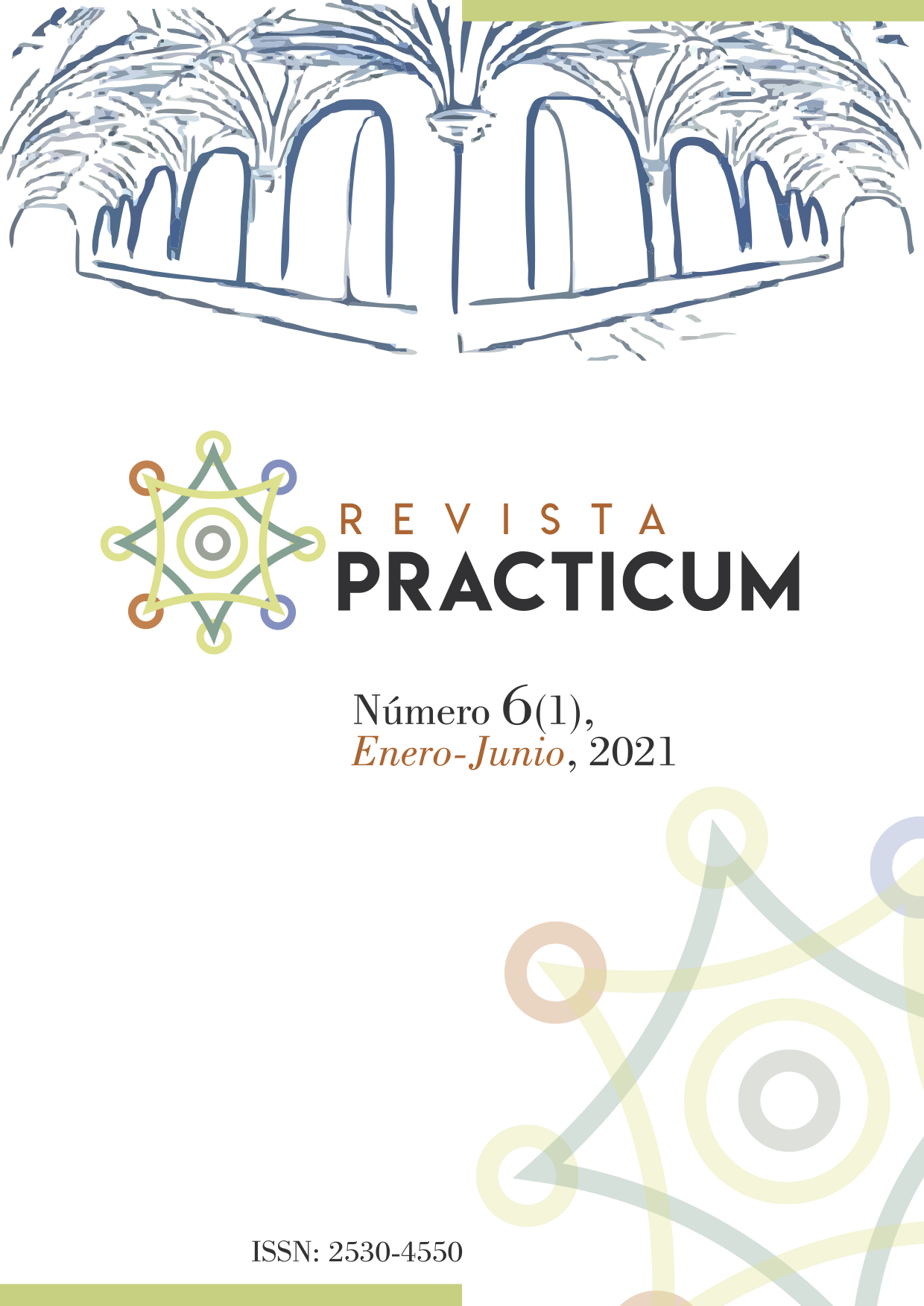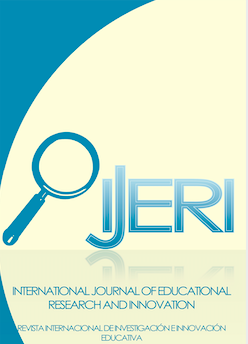Comprobando la eficacia de materiales reflexivos sobre competencias profesionales docentes. Un estudio de investigación-acción
DOI:
https://doi.org/10.24310/RevPracticumrep.v6i1.10230Palabras clave:
Formación de profesores; competencias docentes; Practicum; Investigación-acción, resistencia al cambio.×Resumen
Formar docentes profesionales/competentes es el reto a superar por cualquier programa de formación del profesorado, pero las facultades de educación españolas no dirigen una atención expresa a salvar este problema. El proyecto de investigación-acción que presentamos muestra la eficacia de un material sobre competencias profesionales docentes y el grado en que consigue formar profesores más competentes/expertos, aunque también muestra una gran resistencia en su utilización. La discusión de los resultados, aunque con las limitaciones propias de los estudios de investigación-acción, ofrece una reflexión propicia para la mejora de los actuales programas de formación de profesores de nuestras facultades de educación.
Descargas
Métricas
Publicación Facts
Perfil de revisores N/D
Información adicional autores
Indexado: {$indexList}
-
Indexado en
- Sociedad Académica/Grupo
- N/D
- Editora:
- Universidad de Málaga
Citas
Arias, R., Cantón, I. y Baelo, R. (2017). El Prácticum de las universidades españolas. RIFOP, 88, 109-132
Baker, T., Evers, G. y Brock, R. (2017). Targeted teaching. Sage.
Ball, D. y Bass, H. (2001). Interweaving Content and Pedagogy. En J. Boaler (Ed.), Multiple Perspectives on Teaching and Learning, 83-104. Ablex.
Ball, D. y Forzani, F. (2009). The Work of Teaching and the Challenge for Teacher Education. JET, 60 (5), 497-511. https://doi.org/10.1177/0022487109348479
Berliner, D. (2000). A Personal Response to Those Who Bash Teacher Education. JET, 51 (5), 358-371. https://doi.org/10.1177/0022487100051005004
Berliner, D. (2001). Learning About Learning From Expert Teachers. IJER, 35, 463-482. https://doi.org/10.1016/S0883-0355(02)00004-6
Blatchford, R. (2017). The Teachers’ Standards in Classroom. Sage.
Bronkhorts, L., Koster, B., Meijer, P., Woldman, N. y Vermut, J. (2014). Exploring Teachers’ Resistance to Teacher Education Pedagogies. TATE, 40, 73-82. https://doi.org/10.1016/j.tate.2014.02.001
Capel, S., Leask, M. y Younie, S. (2016). Learning to Teach in Secondary School. Routledge.
Calderhead, J. (1989). Reflective Teaching and Teacher Education. Teaching and Teacher Education, 5 (1), 43-51. http://dx.doi.org/10.1016/0742-051X(89)90018-8
Carr, W. y Kemmis, S. (1986). Becoming critical. Falmer Press.
Chi, M., Glaser, R. y Farr, M. (Eds.). (1988). The Nature of Expertise. LEA.
Chi, M. y Koeske, R. (1983). Network Representation of a Child’s Dinosaur Knowledge. Developmental Psychology, 19, 29-39. http://dx.doi.org/10.1037/0012-1649.19.1.29
Cochran-Smith, M. (2005). Teacher Educators as Researcher. TATE, 21 (2), 218-225. https://doi.org/10.1016/j.tate.2004.12.003
Conferencia de Decanos de las Facultades de Educación. (2017). Modelo de acceso a la profesión docente. Santiago-Universidad.
Darling-Hammond, L. (2006a). Powerful teacher education. JosseyBass.
Darling-Hammond, L. (2006b). Constructing 21st-century teacher education. Journal of Teacher Education, 57 (3), 300-314. https://doi.org/10.1177/0022487105285962
Darling-Hammond, L. y Rothman, R. (2015). Teaching in the flat world. Teachers-College-Press.
Day, C. (2017). Teachers’ Worlds and Works. Routledge.
Duffy, G. y Roehler, L. (1986). Constraints on Teacher Change. JET, January-February, 55-58. https://doi.org/10.1177/002248718603700112
Facultad de Educación Universidad de Granada (2019). Guía para el Prácticum. Grado Educación Primaria.
Forzani, F. (2014). Understanding “Core Practices”. “Practice-Based”. JET, 65 (4), 357-368. https://doi.org/10.1177/0022487114533800
Garret, J. y Segall, A. (2013). (Re)considerations of Ignorance and Resistance. JTE, 64 (4), 284-304. https://doi.org/10.1177/0022487113487752
Glaser, R. y Chi, M. T. (1988). Overview, in M.T.H. Chi, R. Glaser y M.J. Farr (Eds.), The nature of expertise. Erlbaum.
Gobbo, C. y Chi, M. (1986). How Knowledge is Structured and Used by Expert and Novice Children. Cognitive-Development, 1, 221-237.
González-Sanmamed, M. (2015). El Prácticum en la Formación del Profesorado. Revista Española de Pedagogía, mayo-agosto, 301-319.
Gravells, A. (2017). Principles and Practices of Teaching. SAGE.
Hargreaves, A. y Fullan, M. (2012). Professional Capital. Teachers College-Press.
Kaufer, S. y Chemero, A. (2015). Phenomelogy: An introduction. Polity Press.
King, N., Horrocks, C. y Brooks, J. (2019). Interviews in qualitative research. Sage.
Leinhartdt, G. y Greeno, J. (1986). The Cognitive Skill of Teaching. JEP, 8 (2), 75-95. http://dx.doi.org/10.1037/0022-0663.78.2.75
Lortie, D. (1975). Schoolteacher: A Sociological Study. Chicago Press.
Loughran, J. (2002). Effective Reflective Practice. JET, 53 (1), 33-43. https://doi.org/10.1177/0022487102053001004
Marina, J. A., Pellicer, C. y Manso, J. (2015). Libro Blanco para la profesión docente. Ministerio Educación.
McIntosh, P. (2010). Action Research and Reflective Practice. Routledge.
McNiff, J. (2013). Action research. Principles and practices. Routledge.
Midddleton, M., Abrams, E. y Seaman, J. (2011). Resistence and Disentification. New Directions for Teaching and Learning, 126, 67-75. https://doi.org/10.1002/tl.445
Moral, C. (2018). Guía para el Prácticum. Avicam.
Moral. C. (2019). Competencias para el diseño y desarrollo de experiencias de aprendizaje en la formación del profesorado. Síntesis
Moral, C. (próxima publicación). Coherencia curricular del programa de Prácticum para el Grado de Educación Primaria.
Neuendorf, K. (2017). The content analysis. Sage.
OCDE. (2005). Teachers Matter. OCDE.
Ortiz, C. (2012). The Psychology of Lean Improvements: Routledge.
Pollard, A. (2014). Reflective Teaching in Schools. Bloonsbury.
Sellars, M. (2017). Reflective Practice for Teachers. Sage.
Sinnema, C., Meyer, F. y Aitken, G. (2017). Capturing the Comple. JET, 68 (1), 9-27. https://doi.org/10.1177/0022487116668017
Teddlie, C. y Tashakkori, A. (2013). Mixed Methods Research. In Strategies of Qualitative Inquiry. En N. Denzin y Y. Lincoln (Eds.) 135-168. Sage.
Terhart, E. (2013). Teacher Resistance Against School Reform. SLM, 33 (5), 486-500. https://doi.org/10.1080/13632434.2013.793494
Torres, J. y Perea, V. (2009). Cálculo de la fiabilidad y la concordancia. RIE, 27, (1), 89-103.
Van Manen, M. (1977). Linking Ways of Knowing With Ways of Being Practice. Curriculum Inquiry, 6, 205-208. . http://dx.doi.org/10.2307/1179579
Wang, J., Lin, E., Spalding, E., Odell, S. y Klecka, C. (2011). Quality Teaching and Teacher Education. JTE, 62 (4), 115-120. http://dx.doi.org/10.1177/0022487111409551
Wolff, C., Jaodzka, H. y Boshuizen, H. (2017). See and tell: differences between expert and novice teachers. TATE, 66 , 295-308. https://doi.org/10.1016/j.tate.2017.04.015
Zabalza, M. (2011). El Prácticum en la Formación Universitaria. Revista de Educación, 354, 21-43.
Publicado
Cómo citar
Número
Sección
Licencia
La aceptación de la obra conlleva por parte del autor/a ceder a la Revista Prácticum en exclusiva los derechos de reproducción, distribución y venta de su obra en todo el mundo, tanto en formato digital como de papel, CD-rom, etc.
Igualmente los autores/as cederán a la Revista Prácticum los derechos de difusión, comunicación pública en internet y redes informáticas, buses de datos, como cualquier otro portal o dispositivo electrónico para consultas online de sus contenidos y extractos, y bajo las condiciones del portal, repositorios o la base de datos donde se halle la obra.
La Revista Prácticum anima a los autores la publicación y difusión de sus artículos y obras en sus páginas web personales, equipos de investigación, los repositorios institucionales y bases de datos científicas.
Todos los contenidos publicados en Revista Practicum están sujetos a la licencia Creative Commons Reconocimento-NoComercia-Compartirigual 4.0 cuyo texto completo puede consultar en <http://creativecommons.org/licenses/by-nc-sa/4.0>











8.png)








